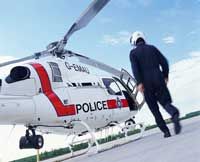Special Units
State troopers, while sometimes smaller in number, are often rich in resources. Because they must be equipped to handle a multitude of situations across the geography of their state, troopers are sometimes trained in special units. Although states will vary in what they offer, here are some of the more common special units:

AFP/Getty Images
- Aviation: Many state police departments have a small fleet of planes and helicopters. These can be used for emergency medical services, search and rescue missions, surveying traffic, chasing criminals on the run or simply transporting officers quickly. The Maryland State Police Department houses 12 helicopters and two airplanes in eight regional locations.
- Forensics: A state's sophisticated forensics equipment and scientists can be huge assets to local police departments. The Louisiana State Police Crime Lab, for instance, has a broad range of capabilities to analyze and properly handle all types of physical and biological evidence found at crime scenes. Its lab is divided into the following substations: DNA, evidence handling, drug analysis, physical evidence, toxicology, and blood alcohol testing. The DNA scientists use a combined DNA index system that compares the DNA taken from crime scenes with that of convicted felons for possible matches.
- Executive Security: State police are to governors what the Secret Service is to the president. State police must protect their governors and other visiting officials. Officers may be stationed at the governor's home to act as security guards for the family and for other state leaders, such as the Speaker of the House and the Lieutenant Governor.
- SCUBA: Underwater diving isn't just for vacations and Sea World. Scuba law enforcement units generally are used for underwater recovery of people or evidence. Although it may not seem like police would perform many scuba-related searches, the unit in the Virginia State Police Department performed 89 in 2004. During those exercises, the divers pulled up 11 bodies, five murder weapons and 11 vehicles [source: Virginia State Police Department].
- Computer Crimes: In today's digitized world, the computer is used in crime, including identity theft and child pornography. The New Jersey State Police Cyber Crimes Unit has worked with corporations when people have hacked into their networks, as well as resolved fraud and identity theft issues. Their computer forensics lab also collaborates with the FBI to analyze forensic information from computers, cell phones and other digital technologies.
- Illegal Drugs: While local police may arrest many people for possession of small amounts of illegal drugs, the state police go after those who make and sell it. Drug enforcement on the state level usually focuses on major cases. The Georgia Bureau of Investigation, the investigative division of the Georgia Department of Public Safety, has three regional offices and 13 multi-county offices that tackle issues of illegal drug smuggling, distribution, drug labs and trafficking [source: Georgia Bureau of Investigation]. Through these consolidated efforts, one drug raid in 2003 netted more than 46,000 marijuana plants worth more than $93 million [source: Georgia Department of Public Safety].
Next, find out how the patrol and investigative branches work together to affect crime.
Advertisement
